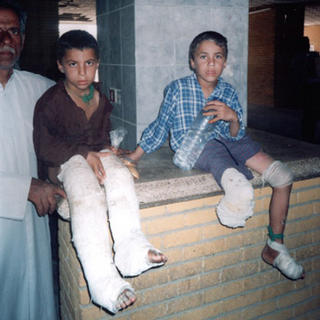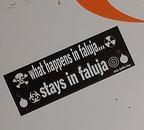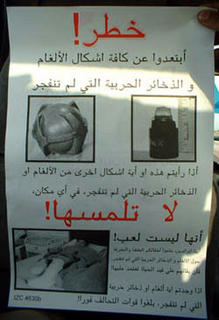Have a clue about Iraq?
I spent yesterday afternoon looking at commentary on Iraq. I found some people who had the words for my thoughts, and learned a bit more than I wanted to know.
There were two articles in Slate that caught my eye. Fred Kaplan reviewed a speech by President Bush. And I could not have said it better:
"I suspect this is why support for the war is waning on the home front—not because Americans doubt that the stakes are high, but because they wonder if the commander in chief knows what he's doing. We were supposed to be in and out of there in a matter of months; Dick Cheney, Donald Rumsfeld, and Paul Wolfowitz all said so. Now it's stretching out for years, with no end in sight—and dubious prospects of meaningful victory."
"Near the start of the speech, Bush declared, "We will never back down, never give in, and never accept anything less than complete victory." What he has to do now—because, after all this time, he still hasn't—is to explain what he means by "victory" and how he plans to get there"
On the same page, Bing West tells a story. "One contractor bid $70,000 to fill a few potholes. Maj. Benjamin Busch of College Park, Md., working with the Civil Affairs Group in Ramadi, estimated that the work should cost $5,000. The contractor protested that he had to buy his own cement trucks because no one was willing to rent to him if it meant entering Ramadi. He then had to hire guards who insisted on driving their own vehicles. He paid local officials for "licenses," he paid the sheik in charge of the local tribe where he was to work. He then had to persuade the insurgents on each street where he was working to accept a payment in exchange for leaving him alone. And his work crew and guards insisted on driving back and forth from Baghdad each day, resulting in about three hours of actual work per day. Busch told him to forget it, but he agreed that such a maze of payoffs and arrangements was typical. It was almost impossible for an outside contractor to work in the city, and local contractors spent more time negotiating with the complex power structure than doing actual work. Hence, $70,000 for a $5,000 job.
Determined to complete at least one job on the streets, Busch brought in two tanks to guard a work detail. Insurgents (without guns) walked around the tanks, gathered the workers together, and told them they had one hour to get out of town. The workers left."
Mr. West also comments on the overall situation.
"The Sunnis dominated the Shiites for centuries, and in war the moral is to the physical as four is to one. We can criticize the intelligence projections and policy choices that led our senior leaders to believe that a sudden blitzkrieg of Baghdad would change centuries of tribal and religious dynamics. But we are where we are. Without the American presence, the Sunni-based insurgency would quickly establish a Taliban-type regime in many cities, as it did last summer in Fallujah. The Iraqi army—predominantly Shiite—is beginning to occupy Sunni cities. Currently, each new Iraqi battalion is partnered with an American battalion. The Iraqi soldiers are steadily improving in on-the-ground operations, because they gain confidence as much as techniques by working side by side with American soldiers. Left on their own at this point, though, their tentative morale would collapse. Supporting the Iraqi army with communications, logistics, maintenance, heavy armor, and quick reaction forces will be necessary for years."
Right now, there are many, many stories being played out in Iraq. If you were to talk to 100 people there, you would get 100 stories. Many are not being heard in America.
Regardless of the wisdom of "regime change", there is a price to be paid. While we have lost 1900+ soldiers and will spend trillions of dollars, the fact remains that Iraq is having a war fought on its land. This will inevitably result in civilian casualties, no matter how careful the invading army is.
"Civilian deaths in Fallujah" Tells the story of a doctor who went into Fallujah after an attack on "terrorists".
"Quien es el Terrorista?" is the shocker. It is an interview with a soldier by an embedded reporter named Paul Rockwell. The soldier describes
how he "lit up" a car with civilians, that turned out not to be terrorists.
He also discusses the issues of depleted uranium and cluster bombs.
"Sgt. Massey: Depleted uranium. I know what it does. It's basically like leaving plutonium rods around. I'm 32 years old. I have eighty-percent of my lung capacity. I ache all the time. I don't feel like a healthy 32-year old. Paul Rockwell: Were you in the vicinity of of depleted uranium? Sgt. Massey: Oh, yeah. It's everywhere. DU is everywhere on the battlefield. If you hit a tank, there's dust. Paul Rockwell: Did you breath any dust? Sgt. Massey: Yeah. Paul Rockwell: And if DU is affecting you or our troops, it's impacting Iraqi civilians. Sgt. Massey: Oh, yeah. They got a big wasteland problem. Paul Rockwell: Do Marines have any precautions about dealing with DU? Sgt. Massey: Not that I know of. Well, if a tank gets hit, crews are detained for a little while to make sure there are no signs or symptoms. American tanks have depleted uranium on the sides, and the projectiles have DU in them. If an enemy vehicle gets hit, the area gets contaminated."
"Paul Rockwell: Cluster bombs are also controversial. UN commissions have called for a ban. Were you acquainted with cluster bombs? Sgt. Massey: I had one of my Marines in my battalion who lost his leg from a cluster bomb. Paul Rockwell: What happened? Sgt. Massey: He stepped on it. We didn't get to training about clusters until about a month before I left. Paul Rockwell: What kind of training? Sgt. Massey: They told us what they looked like, and not to step on them. Paul Rockwell: Were you in any areas where they were dropped? Sgt. Massey: Oh yeah. They were everywhere. Paul Rockwell: Dropped from the air? Sgt. Massey: From the air as well as artillery. Paul Rockwell: Are they dropped far away from cities, or inside the cities? Sgt. Massey: They are used everywhere. Now if you talked to a Marine artillery officer, he would give you the runaround, the politically correct answer. But for an average grunt, they're everywhere. Paul Rockwell: Including inside the towns and cities? Sgt. Massey: Yes, if you were going into a city, you knew there were going to be cluster bombs. Paul Rockwell: Cluster bombs are anti-personnel weapons. They are not precise. They don't injure buildings, or hurt tanks. Only people and living things. There are a lot of undetonated duds and they go off after the battles are over. Sgt. Massey: Once the round leaves the tube, the cluster bomb has a mind of its own. There's always human error. I'm going to tell you. The armed forces are in a tight spot over there. It's starting to leak out about the civilian casualties that are taking place. The Iraqis know. I keep hearing reports from my Marine buddies inside that there were 200-something civilians killed in Fallujah. The military is scrambling right now to keep the raps on that. My understanding is Fallujah is just littered with civilian bodies."
Of course, Fallujah is well known here. For some of the more recent offensives, a news blackout has been imposed.
Tal Afar Residents Return to Ghost City tells the story of Tal Afar, scene of a recent US/Iraq offensive.
The question comes to mind here.... Is this a campaign against the insurgents, or Shiite revenge on Sunnis?
There is no doubt that Saddam and the Sunnis have been brutal over the years. However, we are entering a time of Shiite/Kurd revenge, and revenge is seldom just or equal. This is one of the issues that we must resolve, and I can't help but wonder if any of our leaders has a clue.

1 Comments:
It gets more depressing every day...even for someone like me, whose normally a flag-waving, suport-the-military, Git-R-Done kinda guy. I am sorry I ever supported this incursion in the first place. I trusted that someone in Washington knew what they were doing. But from the time that "Shock and Awe" looked more like Piss and Fizzle, far too many young american lives have been sacrificed on the alter of non-specific timetables and clueless leaders. Sigh.....
Post a Comment
<< Home